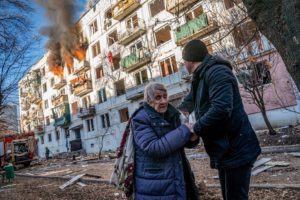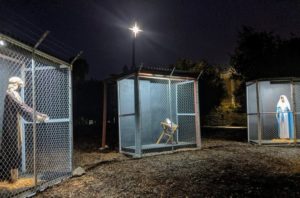Comments, Observations, and Questions
A week before Christmas this year, the Lectionary via Psalm 80 takes us out of any setting we might ordinarily associate with the holidays and settles us instead into a very bleak landscape. There can be no missing in Psalm 80—despite the Lectionary’s attempted leap-frog over the starker verses in the middle of this poem—that this is being prayed to God from a setting of destruction and despair. This is a psalm that reflects on Israel’s experience after Jerusalem and its Temple had been sacked by the Babylonians. This is not a prayer to be offered up to God while sitting in front of a twinkly Christmas tree while a nice fire crackles on the hearth by which Christmas stockings have been hung with care. This is a prayer from the midst of war’s ravages.

This is a refugee psalm. This is an exile’s song. This is in 2022 a psalm for Ukraine (the picture above is from Kyiv earlier this year after Russian missile bombardment). These are the pleadings of someone who has seen his whole world destroyed and is now desperate to find some hope for the future. Don’t set this song to some “Silent Night”-type carol tune. This is not “Joy to the World” or “O Come, All Ye Faithful.” These are the harsh, discordant raspings of the defeated, of the desolate, of the disconsolate. These are prayers begging God to come back to the people whom he for all the world seems to have abandoned. This is a repeated call for the light of God’s face to shine on his people because for the moment, they find themselves in a very dark place with precious little—if any—light to see their path forward.
On the face of it, then, this seems discordant with all the Hallmark and Currier & Ives stuff we usually associate with the Christmas Season. Yet for exactly this reason, these pleadings may fit our real world better than we think. Because let’s face it, we all know there is a level of artificiality to the normal trappings of the holiday season as it has evolved over time. It has gotten to the point that we almost feel as though we have to generate and crank up a false front of good cheer in order to fit in. We have been taught to resist sadness during December even as (for reasons we cannot really articulate were we pressed to do so) we feel worse about bad news from folks this time of the year than we would at any other time.
As I have noted in other Advent sermon commentaries over the years, if a sad event or an outright tragedy happens to someone near the Fourth of July in the United States, we don’t generally worry that this bit of sadness will “ruin” their celebration of Independence Day or forever mar their future observances of it. But when something bad happens close to or on Christmas, we right away find ourselves thinking, “Well, this will ruin their Christmas this year and probably the children of that family will forever associate Christmas Eve with the night their mother died. That’s just so too bad. Christmas is ruined!”
Do we think that sorrow has nothing to do with Christmas and the incarnation of God’s own Son that we mark this time of the year? Can you have either sadness OR Christmas but not both? Does sorrow chase the real meaning of Advent/Christmas clean out of the room?
Or can we remember that it was precisely the sorrows of this world that led to the incarnation in the first place? Can we realize that the refugee and exile pleas that permeate Psalm 80 are precisely the context from which we might best be able to appreciate the birth of God’s Son? The stark setting of Psalm 80 should not look to us to be some exception to the Advent and Christmas Season but perhaps more the rule. Psalm 80’s context of desolation and loss is the context from which many people will mark Christmas once again this year.
Maybe it’s actually the way we all meditate on this miracle if we are honest about it. Maybe we are not literally refugees or people living in exile right now but spiritually speaking we inhabit a world that is in so many ways adrift. And we all have sorrow enough pent up in the secret places of our hearts that we, too, could quite easily find ourselves begging God to rescue us, redeem us, make his face to shine on us so that we can be restored to something akin to what God must have had in mind for this creation when God began the whole thing in the beginning.
The original setting for Psalm 80 has a whole lot more to do with Christmas than we think. Yet this is also a psalm that is to be sung with hope. And like all of the Psalms of Lament, this one is proffered to God in the belief that despite all the wreckage of the world and of our lives that we might be able to see around us at any given moment, God is going to hear this prayer. God is not going to be deaf to us. God will turn his face toward us once more and will shine upon us.
Indeed, Advent means God did this once and for all and definitively when the Light of the World was made flesh long ago. And the evangelist John assures us that this Light shines in the darkness. And the darkness can do nothing to put it out. Now THAT is something worth pondering at Christmas and at all times. It does not deny the darkness the way we sometimes try to do this time of the year (even in the church) but it does tell us that there is a divine face that is shining upon us. And it always will.
Illustration Idea

It made the rounds on Facebook a few years ago and no doubt some—even some reading this sermon commentary—will deem it to be crass partisan politics and no more. But it can be seen as more on at least one level. Someone decided to take the usual nativity scene that can be seen on the front lawns of so many churches in December and depict it in ways that remind us of at least two things at once: first, Christ came into this world because it is a broken, divided place.
But second, the Holy Family really was a refugee family that had to flee to Egypt in order to save the life of Baby Jesus. And in Egypt, Mary and Joseph were exiles for a time until it was safe to return to Nazareth. Were they put into cages? No. It appears that despite their refugee status, Mary, Joseph, and God’s incarnate Son were saved and kept safe for a time (no one is totally sure for how long). But they were as vulnerable as refugees and exiles perennially are in this world (and no one reading Matthew’s account of the flight to Egypt fails to remember what ultimately happened to Israel when it was once in Egypt).
In the Bible it is remarkable that when God called Abram, God’s first word to Abram was “Go!” Abram was well settled in Ur—he had land, flocks, and no doubt a comfortable life. Yet the first step in God’s establishing a covenant with his fallen people was to turn Abram and Sarai into refugees. They would remain refugees for the rest of their lives, first in Egypt and then in Canaan. When Sarah dies years later as recorded in Genesis 24, Abraham has to parlay with the Canaanites in order to buy a plot of ground large enough to bury the love of his life. And in the end, that is exactly how much property he owned, too.
Small wonder, then, that when the ultimate descendant of Abraham came to this earth in the person of Jesus, one of the first things God had to say to Joseph and Mary was “Go!” It’s a reminder that Christ came down to this world to rescue all of us who sense we are exiles, people not living at “home” and pleading with God to shine his face upon us to lead us back to the Home that just is God’s very Self.
Sign Up for Our Newsletter!
Insights on preaching and sermon ideas, straight to your inbox. Delivered Weekly!
Sermon Commentary for Sunday, December 18, 2022
Psalm 80:1-7, 17-19 Commentary